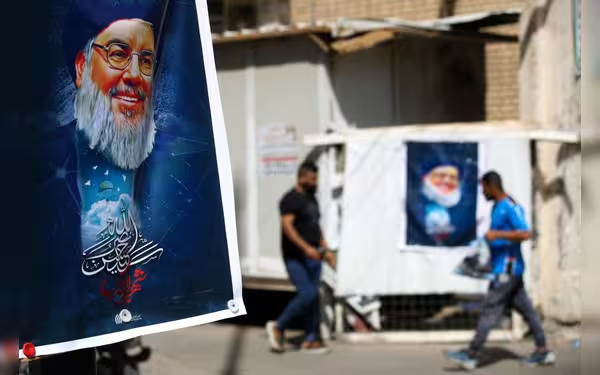Thursday, November 7, 2024 12:44 PM
Israel's Use of US-Made Bomb in Targeting Hezbollah Leader
- US senator confirms Israel used American-made bomb.
- 2,000-pound Mark 84 bomb targeted Hezbollah's Nasrallah.
- Concerns rise over US military support to Israel.
 Image Credits: arabnewspk
Image Credits: arabnewspkUS senator reveals Israel used American-made bomb in airstrike targeting Hezbollah leader Hassan Nasrallah, raising concerns over military support.
In a significant development in the ongoing conflict in the Middle East, a US senator has revealed that the bomb used by Israel to target Hezbollah leader Sayyed Hassan Nasrallah was an American-made weapon. This revelation comes in the wake of a recent airstrike in Beirut, which has raised questions about the nature of military support provided by the United States to its ally, Israel.
During an interview with NBC, Senator Mark Kelly, who chairs the Senate Armed Services Airland Subcommittee, disclosed that the weapon in question was a 2,000-pound Mark 84 series bomb. This statement marks the first official acknowledgment from the US regarding the specific type of weapon used in the attack. Senator Kelly emphasized, "We see more use of guided munitions, JDAMs, and we continue to provide those weapons." JDAM stands for Joint Direct Attack Munitions, which are designed to convert standard unguided bombs into precision-guided munitions.
The Israeli military confirmed that Nasrallah was eliminated in a strike targeting the group’s central command headquarters located in the southern suburbs of Beirut. However, the Israeli military has refrained from commenting on the specific weapons employed during this operation. The Pentagon has also not provided immediate comments regarding the incident.
It is important to note that JDAMs enhance the accuracy of bomb strikes, allowing for more effective targeting while minimizing collateral damage. The United States has been a longstanding ally of Israel and remains its largest arms supplier, which raises concerns about the implications of such military actions on regional stability.
This incident underscores the complex dynamics of international relations and military support. As the situation continues to evolve, it is crucial for observers to consider the broader implications of such military engagements, not only for the countries directly involved but also for the stability of the entire region. The use of American-made weapons in foreign conflicts raises ethical questions about the responsibility of arms suppliers and the potential consequences of their use in warfare.
The revelation of the type of bomb used in the attack on Nasrallah serves as a reminder of the intricate web of alliances and military strategies that shape the geopolitical landscape. As nations navigate these challenging waters, it is essential to remain informed and engaged in discussions about the impact of military actions on global peace and security.













